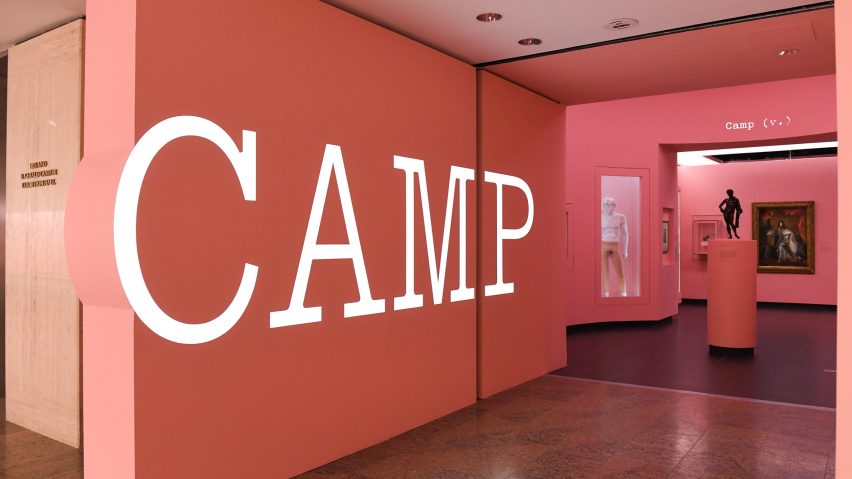The Met's Costume Institute has unveiled a pink-hued exhibition exploring camp fashion across the centuries, from the playful to the outrageous.
Camp: Notes on Fashion opens this week, following the Met Gala on Monday. Camp was chosen as the theme, thanks to the rising trend for deliberately exaggerated and theatrical fashion.
"We are experiencing a resurgence of camp," said Andrew Bolton, chief curator for the Costume Institute, at a launch event earlier this week.
Although usually associated with LGBT culture, the word camp describes anything that is intentionally ostentatious or excessively effeminate.
"This exhibition might raise more questions than it answers: 'Is camp gay' 'Is camp political?' And, ultimately, 'What is camp?'," reads a statement from The Met.
"There are periods, however, including the 1960s, the 1980s, and the era in which we live now, when camp comes to the fore as the defining aesthetic of the times," it said.
"It is no coincidence that camp resurfaces during moments of social, political, and economic instability – when society is polarised – because, despite its mainstreaming, it has never lost its power to subvert and to challenge the status quo."
The show features meandering exhibition spaces, all coloured in a vivid shade of pink.
Glass vitrines display objects from The Met's collection with a camp sensibility, including sculptures, paintings and drawings dating from the 17th century to the present. There are also 140 fashion ensembles on show.
Guiding the entire exhibition is Susan Sontag's seminal 1964 essay, Notes on Camp, which describes camp as an aesthetic. The work was so influential that it catapulted the word camp into mainstream culture.
The essay features at the start of the exhibition, in a study of the etymology and origins of camp. Another installation displays Sontag's 58 principles of camp, which include irony, humour, parody, pastiche, artifice, theatricality and exaggeration.
Sontag's words also crop up again in an echo chamber that concludes the show.
This dark, double-height room is filled with colourful glass fronted boxes containing examples of camp fashion, with titles like Gender without Genitals, and Dandyism in the Age of Mass Culture.
Layered audio snippets create the echo-chamber effect. Many of these are Sontag's original quotes, spoken by prolific fashion designers, and overlaid with interjections of Judy Garland singing Over the Rainbow.
"Camp’s disruptive nature and subversion of modern aesthetic values has often been trivialised, but this exhibition reveals that it has had a profound influence on both high art and popular culture," said Max Hollein, director of The Met.
"By tracing its evolution and highlighting its defining elements, the show embodies the ironic sensibilities of this audacious style, challenges conventional understandings of beauty and taste, and establishes the critical role that this important genre has played in the history of art and fashion."
One of the first rooms in the show includes an Italian bronze statue of a boy, which was part of a collection belonging to King Louis XIV of France. It features in a room themed Beau Ideal, in reference to an early 19th-century concept of male beauty.
The exhibit continues with more art relating to Versailles, the royal courts of Louis XIV and Louis XV, and objects exploring the figure of the dandy.
The exhibit then traces camp's origins to the queer subcultures of Europe and America in the late 19th and early 20th centuries.
Designers featured include Vivienne Westwood, Karl Lagerfeld, Chanel, Erdem, Jeremy Scott and Maison Margiela. Also included are outfits worn by Anglo-Irish poet and playwright Oscar Wilde, who is inextricably linked to the image of the effeminate aristocrat.
The Met's Costume Institute organises a spring exhibition every year. Last year's, Heavenly Bodies, was themed on religion, while others have included a retrospective of Comme des Garcons founder Rei Kawakubo, a study of handcraft and machine production, and an exploration of China.
Camp: Notes on Fashion opens to the public on 9 May 2019 and runs until 8 September 2019.
Photography is by Zach Hilty courtesy of the Metropolitan Museum of Art.
Project credits:
Exhibit curators: Andrew Bolton, Karen Van Godtsenhoven, Amanda Garfinkel
Exhibit design: Jan Versweyveld, Raul Avila
Headdress design: Stephen Jones

